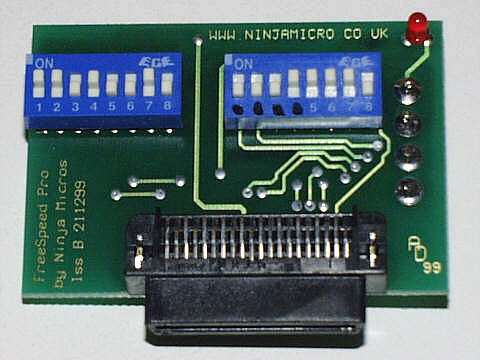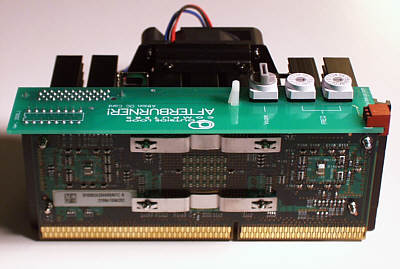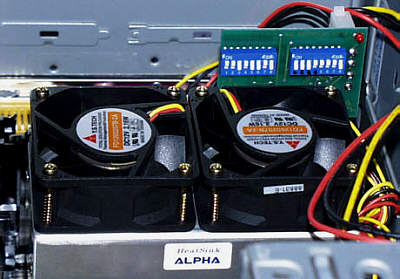
The presence of the so-called "Golden
Fingers" connector on the Athlon processor has led a number of
companies to manufacture variable-resistance add-on cards that will fit
this connector. They allow the user to adjust the resistance values
in the circuits that determine the multiplier setting on the processor.
A UK-based company called Ninja
Micros has introduced a low cost dip-switch type Golden Finger card
for overclocking the AMD Athlon CPU called the "FreeSpeed Pro".
Athlon processors currently can be
overclocked by applying different voltages and resistances to the
Golden-Fingers edge connector. So Athlon overclock cards are simple
circuits that apply variable voltages and resistances to the individual
fingers on the Golden Fingers connector. The two variables you can change
are the core voltage supplied to the CPU, and the multiplier that is
applied to the CPU. You can read more about Athlon Overclocking here.
The FreeSpeed Pro was the second commercial
unit to market, and has the distinct advantage of being less expensive
than the competition. Ninja Micro kept the board small, and used the
less expensive dip-switch method to adjust resistance values. The first
commercial Athlon overclock card we know of was the Afterburner, which we
reviewed here.
There is no functional difference between the two cards, but there are
physical differences.
The Afterburner lays flat across the top of
the Athlon's printed circuit board. It does not have a secure method
of fastening it to the Athlon.

In contrast, the FreeSpeed Pro is smaller,
and sticks vertically up from the Golden Finger connector. It also
does not come with a method of securing it to the Athlon, but due to it's
smaller size, it stays on the Golden Finger connector better.

Because it sticks out of the Athlon
vertically, the FreeSpeed Pro can not be used with cases that have CPU
cooling fans like the Antec Gemstone Series, including the Sapphire and
Ruby designer cases.
We tested the FreeSpeed Pro overclock card
on two OEM Athlon 550 CPUs with the Alpha heat sink and cooler installed.
Both CPUs ran perfectly at 700MHz with a core voltage of 1.7 volts.
By increasing the core voltage to 1.75 we got one of the two CPUs to be
stable at 750MHz, but the other processor did not pass our stability tests
at this speed. These are the same results we obtained with the
Afterburner card. So even though the Afterburner card is easier to set the
core voltage and multiplier settings using dials, the FreeSpeed Pro is
functionally equivalent, and costs $15 to $20 (US) less. This makes
the FreeSpeed Pro the best value for overclocking your Athlon CPU.
Overclocking Note:
If you have the Asus K7M motherboard, and get a warning beep when you
overclock the your Athlon, you can fix this by turning off the BIOS
monitoring of the CPU core voltage. Telling the BIOS to ignore the core
voltage will stop the beeping. Check your Asus K7M manual if you
don't know how to do this.
Summary:
The FreeSpeed Pro is the way to go to help
keep costs down while overclocking your Athlon CPU as high as it will
go. And after all, the whole purpose of overclocking is to save
money over buying the high-priced, higher speed Athlon CPUs.
|